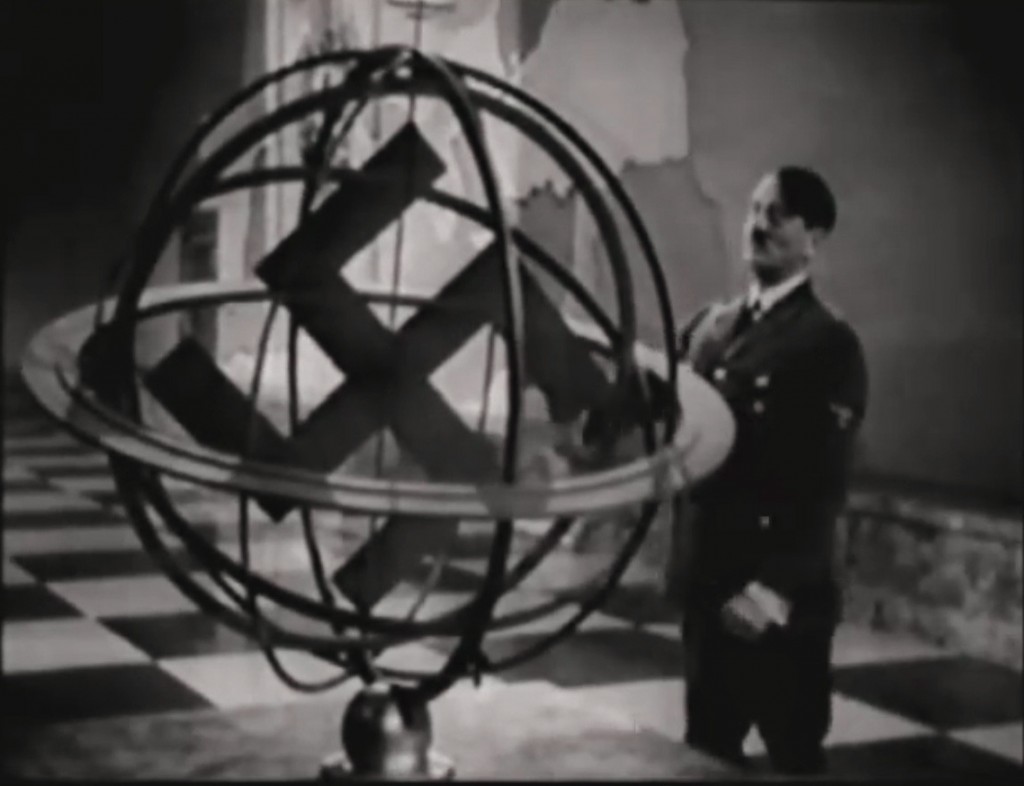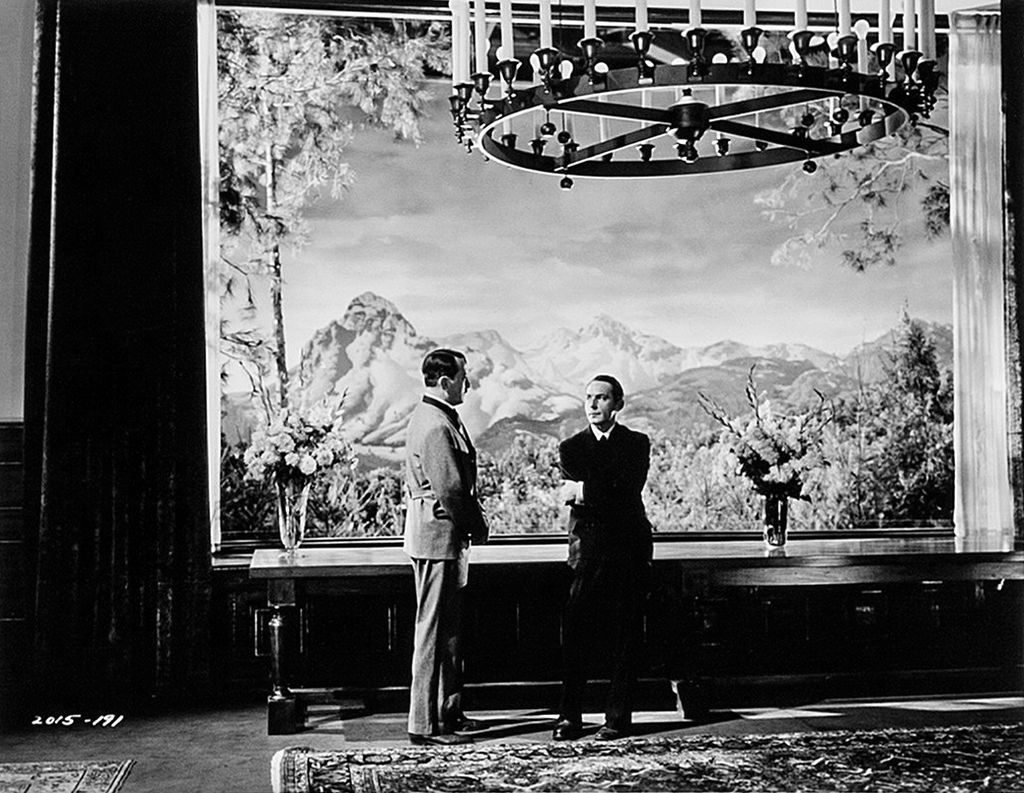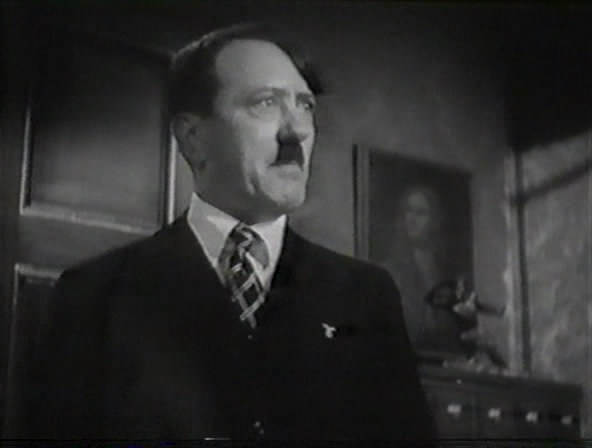The Hitler Gang (1944)
DIRECTOR: John Farrow
CAST:
Robert Watson, Martin Kosleck, Roman Bohnen, Victor Varconi, Luis van Rooten, Alex Pope, Sig Ruman, Fritz Kortner, Tonio Stalwart, Alexander Granach, Poldi Dur, Helene Thimig, Reinhold Schünzel, Ludwig Donath
REVIEW:
 The Hitler Gang is a curious (albeit highly dated) little time capsule—a docudrama about the rise of Adolf Hitler and Nazi Germany made in 1944, when both still existed. Considering its production during WWII and Hitler’s lifetime, its propagandistic slant is unsurprising, but what’s a little more intriguing is that The Hitler Gang actually makes an effort to portray its subject matter with a level of seriousness and historical accuracy (to a point). The result is heavily dated by today’s standards, but retains a certain level of interest both as essentially a biopic made about Hitler while the real Hitler was still alive, and as a slice of Allied propaganda that doesn’t completely abandon the facts.
The Hitler Gang is a curious (albeit highly dated) little time capsule—a docudrama about the rise of Adolf Hitler and Nazi Germany made in 1944, when both still existed. Considering its production during WWII and Hitler’s lifetime, its propagandistic slant is unsurprising, but what’s a little more intriguing is that The Hitler Gang actually makes an effort to portray its subject matter with a level of seriousness and historical accuracy (to a point). The result is heavily dated by today’s standards, but retains a certain level of interest both as essentially a biopic made about Hitler while the real Hitler was still alive, and as a slice of Allied propaganda that doesn’t completely abandon the facts.
We open in 1919 at the tail end of WWI, with Corporal Adolf Hitler (Robert “Bobby” Watson), suffering from “hysterical blindness” in a military hospital after a poison gas attack. After recovering, Corporal Hitler gets his foot in the door with his superior Captain Ernst Roehm (Roman Bohnen) by snitching on soldiers he overhears talking mutiny. Roehm gives him a job as a paid informant, and sends him to the German Workers Party, where the power-hungry Hitler quickly gains a leadership position in the fledgling Nazi Party and interests Roehm enough for the Captain to convince his army superiors to bankroll the up-and-coming political rabble-rouser. Hitler’s speech-making skills attract other ne’er-do-wells, including Gregor Strasser (Fritz Kortner), who’s interested in the Party’s aims but skeptical of Hitler’s leadership abilities, Strasser’s creepy chauffeur Heinrich Himmler (Luis van Rooten), the faithful Rudolf Hess (Victor Varconi), radical philosopher Alfred Rosenberg (Tonio Stewart), and the Party’s newspaper editor Julius Streicher (Alexander Granach). As the Nazis’ influence grows, “respectable” military figures climb onboard the bandwagon—WWI fighter ace Captain Hermann Goering (Alex Pope), who organizes stormtroopers to protect their meetings and attack their opponents, renowned General Ludendorff (Reinhold Schünzel), and Captain Roehm himself. In the early 1920s, Hitler makes his first bid for power, marching on the Bavarian Defense Ministry, but the infamous Beer Hall Putsch is a fiasco and he spends a year in Landsberg Prison, where an astrologer advises him to take a few years off to crystallize his ideas and formulate his plans, and he gains a new ally, shrewd propagandist Josef Goebbels (Martin Kosleck). After his release, Hitler goes for some R&R at his mountain retreat, attended to by his half-sister Angela (Helene Thimig) and his young niece Geli (Poldi Dur), with whom he becomes disturbingly fixated. When he finally climbs back into the Nazi saddle, Hitler decides to try a lighter touch, gaining power with legal votes instead of armed force. With the help of Goebbels and company, he promises everything to everyone, swelling the Nazis’ popularity until President von Hindenburg (Sig Ruman) ill-advisedly appoints him as Chancellor just to get him under control (history shows how well that worked out). Once installed in the Chancellery, the ever-increasingly megalomaniacal Hitler and his merry band plot to undermine the church, indoctrinate children into Nazism, and build up the military in preparation for another war. In the “climax”, Hitler strikes a Devil’s pact with the Army: turn on his benefactor Ernst Roehm, who made his every success possible, and wipe out he and his stormtroopers, whom the Army disapproves of, in exchange for them promising him absolute power after President von Hindenburg’s death. The rest, as they say, is history.
 Viewed from a modern lens, The Hitler Gang has all the hallmarks of a film made in 1944. Everything is overdramatic—the acting, the music, the direction, the narration—sometimes to an unintentionally comical extent. It also takes a fair amount of “dramatic license”, hardly unexpected considering it was an American propaganda production made during WWII, while the battle against Hitler’s Nazi Germany was in full swing. What’s more surprising and interesting is the amount of accurate historical detail it includes, and the legitimate serious effort it makes to stay relatively close to the facts. It’s worth going into the movie with a grain of salt, but considering its propaganda intentions, it’s not nearly as outlandish as it could have been. Part of this is no doubt simply because Hitler did such a good job of making himself look bad all on his own that he pretty much did the filmmakers’ job for them, but the filmmakers obviously put some surprisingly thorough research into the production, even getting the goods on Hitler’s sexual attraction to his niece Geli, the plotline that you might most suspect of being made up just to bump up his creep factor but is in fact corroborated by various sources, and other details like Goering’s shrapnel injury and subsequent morphine addiction and stint in an insane asylum after the Beer Hall Putsch.
Viewed from a modern lens, The Hitler Gang has all the hallmarks of a film made in 1944. Everything is overdramatic—the acting, the music, the direction, the narration—sometimes to an unintentionally comical extent. It also takes a fair amount of “dramatic license”, hardly unexpected considering it was an American propaganda production made during WWII, while the battle against Hitler’s Nazi Germany was in full swing. What’s more surprising and interesting is the amount of accurate historical detail it includes, and the legitimate serious effort it makes to stay relatively close to the facts. It’s worth going into the movie with a grain of salt, but considering its propaganda intentions, it’s not nearly as outlandish as it could have been. Part of this is no doubt simply because Hitler did such a good job of making himself look bad all on his own that he pretty much did the filmmakers’ job for them, but the filmmakers obviously put some surprisingly thorough research into the production, even getting the goods on Hitler’s sexual attraction to his niece Geli, the plotline that you might most suspect of being made up just to bump up his creep factor but is in fact corroborated by various sources, and other details like Goering’s shrapnel injury and subsequent morphine addiction and stint in an insane asylum after the Beer Hall Putsch.
It’s also worth noting that in contrast to many other depictions, Hitler is portrayed as less of a raving psychopath and more of a cynical, manipulative, ruthless, and power-craving politician. For example, his anti-Semitism is shown as less a product of personal hatred and more of a calculated search for a vulnerable minority to scapegoat for Germany’s defeat in WWI. While I’m not sure if I entirely buy that one—I’m inclined to believe Hitler’s beef with Jews was more a personal obsession than the movie makes out—I do think the depiction of him as a calculating politico is more accurate than some other films that have him as a raving maniac from the get-go (the ridiculous Hitler: The Rise of Evil miniseries, which is more of a caricaturish hatchet job than this). Considering the time at which it was made,the movie is relatively violent, especially in the interminably drawn out montage of The Night of the Long Knives—the Nazis’ massacre of Roehm, his SA subordinates, and basically any other unfortunate soul that a Party bigwig happened to have a beef with—and even slyly hints in a veiled way at Roehm’s homosexuality (the framed pictures of naked men wrestling hanging on his office wall) and implies incestuous rape (Hitler unbuttoning his overshirt and loosening his tie before stepping into Geli’s bedroom in the middle of the night and closing the door behind him, followed by sounds of her crying). The movie throws in some gallows humor, especially in the lead-up to the Night of the Long Knives as Himmler and Goering compare their list of victims while playing cards. A man named Willy Schmidt is murdered by the SS, only for Hitler to find that it’s the wrong Willy Schmidt and order them to go find the right one. When Goebbels reads a newspaper story about anti-Nazi journalist Fritz Gerlich shooting himself, Julius Streicher dryly remarks “he’s the first man to shoot himself in the head six times”. Easily the biggest case of sensationalism is its theorizing that Geli was murdered by Himmler to get Hitler back on track (not completely beyond the realm of possibility, but there is no concrete evidence that it wasn’t the suicide it was ruled as). The movie also paints Hitler as an abject coward, showing him scurrying away and stealing a car when the Beer Hall Putsch runs into police resistance, and later getting caught hiding in a closet, when in reality he volunteered as a dispatch runner during WWI carrying messages across No Man’s Land between the trenches in arguably the most dangerous job of the war, for which he was awarded the Iron Cross. Historians also agree that Hitler was blinded by mustard gas, as opposed to the movie’s “hysterical blindness” distortion seemingly aimed at making him look like more of a big sissy. It also exaggerates how easily he was manipulated by his inner circle, to the point where it runs the verge of probably unintentionally almost making Hitler seem marginally less evil than those around him, but this is all part of the aim of portraying “The Hitler Gang” as a nest of vipers.
 Bobby Watson was a primarily comedic actor who played Hitler nine times, mostly in comedic parodies, making this the only time he played the Führer straight (as if to reflect the “seriousness” of his role here, he was even credited more formally as “Robert Watson”). The movie’s biggest ace in the hole is Watson’s striking, at times nearly uncanny, physical resemblance to Hitler. It’s hard to imagine any actor looking more like Hitler than Watson does here. Unfortunately, Watson’s acting isn’t nearly as impressive, in the same overdramatic ’40s style as everyone else’s, and the Springfield, Illinois native’s attempt at a German-ish accent is a little silly. Watson’s voice lacks authority, and he can’t capture Hitler’s dynamic charisma as a public speaker, despite other characters commenting on how “amazing” his speech-making is. On the plus side, he does a fair to good job with body language and physical mannerisms, and has the right intense look in his eyes. Of the others, Martin Kosleck (who also played Goebbels in several films) and Luis van Rooten are suitably sinister as Goebbels and Himmler, lurking around in the background whispering advice and insinuations in Hitler’s ear like devils on his shoulder. The filmmakers obviously made an effort to cast the Nazis with actors who resembled them (the best casting in the movie, physically speaking, is Victor Varconi’s uncanny resemblance to Rudolf Hess). The film makes a moderate effort to give Hitler’s closest underlings a little individual distinction, with Goebbels as the shrewd, scheming propagandist, Himmler as the glorified pencil-pusher who enjoys “exact work” and collects dossiers on the other Nazis’ dirty laundry to keep them in line, Hess as the lightweight faithful sidekick who gets edged out of the inner circle, and Strasser as the pragmatist who supports Hitler’s goals but not his leadership and earns a spot on the Night of the Long Knives hit list by expressing his disapproval too many times. Albert Speer, Martin Bormann, and Eva Braun are MIA.
Bobby Watson was a primarily comedic actor who played Hitler nine times, mostly in comedic parodies, making this the only time he played the Führer straight (as if to reflect the “seriousness” of his role here, he was even credited more formally as “Robert Watson”). The movie’s biggest ace in the hole is Watson’s striking, at times nearly uncanny, physical resemblance to Hitler. It’s hard to imagine any actor looking more like Hitler than Watson does here. Unfortunately, Watson’s acting isn’t nearly as impressive, in the same overdramatic ’40s style as everyone else’s, and the Springfield, Illinois native’s attempt at a German-ish accent is a little silly. Watson’s voice lacks authority, and he can’t capture Hitler’s dynamic charisma as a public speaker, despite other characters commenting on how “amazing” his speech-making is. On the plus side, he does a fair to good job with body language and physical mannerisms, and has the right intense look in his eyes. Of the others, Martin Kosleck (who also played Goebbels in several films) and Luis van Rooten are suitably sinister as Goebbels and Himmler, lurking around in the background whispering advice and insinuations in Hitler’s ear like devils on his shoulder. The filmmakers obviously made an effort to cast the Nazis with actors who resembled them (the best casting in the movie, physically speaking, is Victor Varconi’s uncanny resemblance to Rudolf Hess). The film makes a moderate effort to give Hitler’s closest underlings a little individual distinction, with Goebbels as the shrewd, scheming propagandist, Himmler as the glorified pencil-pusher who enjoys “exact work” and collects dossiers on the other Nazis’ dirty laundry to keep them in line, Hess as the lightweight faithful sidekick who gets edged out of the inner circle, and Strasser as the pragmatist who supports Hitler’s goals but not his leadership and earns a spot on the Night of the Long Knives hit list by expressing his disapproval too many times. Albert Speer, Martin Bormann, and Eva Braun are MIA.
The biggest narrative problem with The Hitler Gang is that it lacks a true ending (an inevitability, considering WWII was ongoing at the time of its release and Hitler’s suicide in his bunker hadn’t happened yet). Instead, the Night of the Long Knives serves as the climax point, followed by a “RAH RAH DEMOCRACY” rousing patriotic closing montage of waving flags of all the countries that had joined the war effort against Hitler and Nazi Germany. One could also argue that by highlighting the nest of vipers with which he surrounded himself (and was sometimes manipulated by) so much, the movie unintentionally and ironically downplays Hitler’s own evil. It’s clear the behind-the-scenes moments of him cynically choosing Jews as a random convenient scapegoat, and the humorous montages of him promising one thing to one voting bloc, then turning straight around and promising the exact opposite to another (we see him giving a rousing speech in a factory pledging to protect the labor unions, then obsequiously promising to destroy the labor unions while courting the financial support of aristocratic business owners), are aimed at portraying Hitler as a phony and a charlatan, but the movie goes so far portraying him as a fork-tongued politician that it greatly downplays his underlying fanaticism. The movie’s Hitler almost seems like too much of a mere power-mongering politician to bother being the man behind WWII and the Holocaust, and neither he nor anyone else seems to talk about Jews very much, certainly not as much as the real Nazis did. The movie also tries to get a “boo, hiss” reaction out of God-fearing American audiences by exaggerating the Nazis’ hostility to religion; in fact, they frequently invoked Christianity and held it up against “godless Bolshevism” (the sincerity of their professed religious beliefs is another debate).
In any event, The Hitler Gang, like many (not all) films from its time, seems silly from modern sensibilities, dated and melodramatic to an unintentionally comical extent, and rightfully viewed with a grain of salt and the awareness that it was wartime propaganda, but for the context of the time in which it was made, it’s surprisingly historically accurate, and makes a far more reasonable effort than most propaganda to stick to the record. It’s no great timeless enduring classic, but if nothing else, it’s an interesting little time capsule, dramatizing Hitler’s crimes (at least those that were yet publicly known) during his own lifetime, and rousing American audiences against a detestable man and his ilk while—mostly—damning him with the facts he had himself provided.
**1/2